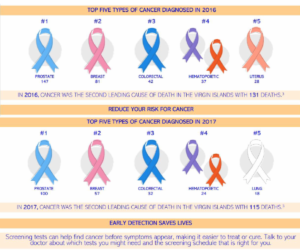CHRISTIANSTED — The Virgin Islands Department of Health’s Chronic Diseases and Prevention Division has updated Virgin Islands Cancer Registry’s 2016 and 2017 Cancer Incidence Reports with the breast and prostate among the top types of cancer diagnosed in the two-year period.
“Continued tracking of new cancer cases, deaths, and survival over time are vital to help public health professionals and scientists understand the progress we have made in cancer prevention, screening, diagnosis, and treatment as well as to identify gaps that still exist,” said Lyna Fredericks, Director of Chronic Disease for the Virgin Islands Department of Health. “This incidence report displays the most up-to-date data on cancer incidence in the USVI.”
The Virgin Islands Central Cancer Registry is an epidemiologic surveillance system designed to collect information regarding incidence, distribution, risk factors and mortality of cancer. This information is essential to public health professionals, researchers, the medical community, and policymakers to understand and address the disease.
2016 Cancer Incidence in the U.S. Virgin Islands Residents
According to the latest data, in 2016, 525 new cancer cases developed – 257 on St. Croix, 237 on St. Thomas and 25 on St. John – and the top three types of cancer among Virgin Islands men were prostate (147 cases or 48.8 percent), hematopoietic (26 cases or 8.6 percent) and colorectal (23 cases or 7.6 percent). Male incidences of cancer in 2016 totaled 301.
Among Virgin Islands women, the top three cancers were breast (81 cases or 36.2 percent), uterus (28 cases or 12.5 percent) and colorectal (19 cases or 8.5 percent). Female incidences of cancer totaled 224.
In 2016, cancer was the second leading cause of death in the Virgin Islands with 131 persons succumbing to the painful disease.
2017 Cancer Incidence in the U.S. Virgin Islands Residents
In 2017, 347 new cancer cases developed – 167 on St. Croix, 166 on St. Thomas and 14 on St. John. The report indicates that in 2017 cancer incidence decreased in comparison to the 2016 cancer incidence. While more statistical analysis is needed, a decrease in numbers was expected due to the impact of Hurricanes Irma and Maria on the Health Care System in the Virgin Islands.
According to the data collected, the top three cancer among Virgin Islands men were prostate (100 cases or 49 percent), colorectal (18 cases or 8.8 percent), and hematopoietic (14 cases or 6.9 percent). Male incidence totaled 204 in 2017.
Among Virgin Islands women, the top three cancers in 2017 were breast (57 cases or 39.9 percent), uterus (14 cases or 9.8 percent) and colorectal (11 cases or 7.7 percent). Female incidence of cancer totaled 143 in 2017.
In 2017, cancer remained the second leading cause of death in the Virgin Islands with 115 deaths reported.
“The VICCR has experienced delays with data reporting from health care providers due to the 2017 Hurricanes and the COVID-19 pandemic,” Director Fredericks said. “Currently, the VICCR is working expeditiously to catch up on data collection and anticipates the release of 2018 and 2019 cancer incidence by Fall 2023.”
The Virgin Islands Central Cancer Registry collects information from the Territory’s hospitals, on-and-off island pathology laboratories, free-standing chemotherapy clinics and some physicians. The USVI’s registry also has agreements with central cancer registries in other states to obtain information on Virgin Islands residents who are diagnosed with or receive treatment for cancer in these states.
The data collected includes, but is not limited to, information about the person diagnosed with cancer, such as age, sex, race, place of residence and occupation. The department also collects information on the type of cancer diagnosed and the stage at which the cancer was diagnosed.
VI Health Commissioner Justa Encarnacion added that, “Cancer data is critical to helping us measure our efforts in reducing cancer in our territory. It allows us to determine risk factors such as environmental, social behaviors and heredity that contribute to new cancer cases, illnesses related to cancer and its side effects or deaths resulting from cancer. The data also helps us make informed public health decisions so that we maximize our resources to the best effect in prevention and treatment.”
The Virgin Islands Central Cancer Registry started the collection of cancer data for cases diagnosed on January 1, 2016, onward.
To view the full report, visit Chronic Disease and Prevention | USVI Department of Health

